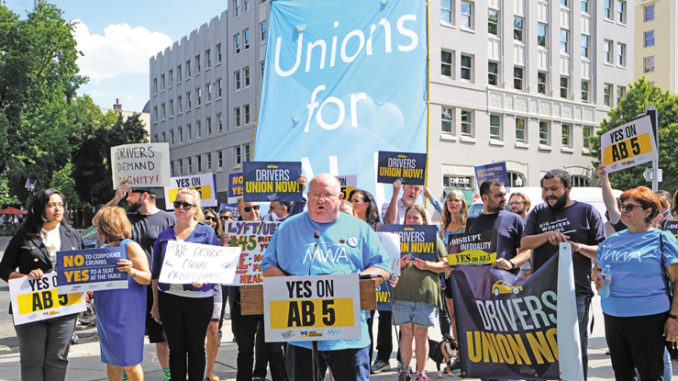
These new laws will help workers
This week, Jews around the world are celebrating the end of their New Year period with a day of fasting on Yom Kippur, October 9th. For some, it is a day to focus on doing better next year, and asking forgiveness from people they have wronged. For some, the pain of hunger during a 24-hour fast helps them to connect with people who spend many days, weeks and months going to bed hungry and getting up hungry. It is a period of celebration as well as seriousness.
The legislative session in California is also coming to an end, and Gavin Newsom has worked diligently with labor and community organizations to look at using his position to help advance his vision for a California for All.
Gov. Newsom started this year with a renewed hope for a California Dream. He recognized that too many Californians are experiencing the squeeze of stagnant wages and the rising price of building-block necessities such as housing, health care, education and child care.
This week, I want to highlight three bills he signed that resonated with me – and Local 1000’s vision – to eradicate poverty, change how we distribute the vast wealth of our state and our country, and make it easier for people to join unions, which will help improve working conditions and wages.
SB 206, nicknamed “Fair Pay to Play,” is a boon to college athletes. It allows them to get paid for endorsements and the use of their image without losing their scholarships.
Under restrictions by the National Collegiate Athletic Association, universities and the sports industry had made billions off these kids while the student athletes themselves struggled to get by. Coaches and staff got six- or even seven-figure contracts while the players were not allowed to profit from their work on the field or court until after they left school. It’s even worse for women athletes, since only about 1% go on to professional sports.
“Collegiate student athletes put everything on the line – their physical health, future career prospects and years of their lives to compete. Colleges reap billions from these student athletes’ sacrifices and success but, in the same breath, block them from earning a single dollar,” Newsom said.
“Assembly Bill 5 is an important step. A next step is creating pathways for more workers to form a union, collectively bargain to earn more and have a strong voice at work.”
Gov. Gavin Newsom
AB 378 allows family child care providers to negotiate a contract with the state for improvements to the child care system, such as expanding access to child care for working families, improved training, increasing the standards of quality care, and negotiating for pay that can support their own families. After 16 years of taking action and standing strong, child care providers have won the right to collectively bargain a contract with the State of California.
This bill comes in addition to the increased funding for affordable child care slots and funding to provide year-long care for low-income families, as well as funding for increased reimbursement and facilities grants that Gov. Newsom included in his budget.
AB 5 restores employment status to more than a million California workers misclassified as “contractors.” Looking to cut costs at the expense of workers, companies relied on this illegal business model to decimate the state’s worker safety-net programs, and subject law-abiding businesses to unfair competition. Uber drivers, for example, must pay their own car insurance, repairs, maintenance and gas. Their employer avoids paying workers compensation, disability, sick leave or unemployment insurance.
Mike Robinson was one of those “contractors.” A former union sheetmetal worker, Mike started driving Lyft full time after his factory was bought by an overseas billionaire. But as the rates went down, he had to drive longer hours to make ends meet. At the same time, the CEO of Lyft has a net worth of $695 million. Mike is now dedicated to fighting for a union for gig workers.
In his message about the bill, Gov. Newsom included the importance of taking the next step and creating pathways for more workers to form a union: “Assembly Bill 5 is an important step. A next step is creating pathways for more workers to form a union, collectively bargain to earn more and have a strong voice at work.”
It is heartening to see legislators such as Assemblywoman Lorena Gonzalez, the bill’s author, and Gov. Newsom recognizing the critical role unions play in advocating for workers so that they are not misclassified, overworked, underpaid or abused on the job.

president,
SEIU Local 1000
PHOTO COURTESY OF SEIU local 1000


